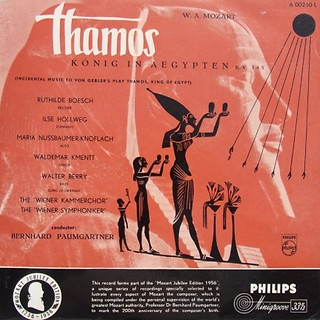Wolfgang Amadeus Mozart
Thamos, King of Egypt

Thamos, King of Egypt (or King Thamos; in German, Thamos, König in Ägypten) is a play by Tobias Philipp, baron von Gebler, for which, between 1773 and 1780, Wolfgang Amadeus Mozart wrote incidental music, K. 345/336a, of an operatic character.
Early performances
It is not known for certain whether the music that Mozart composed was performed with the play during his lifetime. The play's première took place at the Kärntnertortheater in Vienna, probably on 4 April 1774, by which time two choruses had been written. Performances in Salzburg in 1776 and 1779-80 may have incorporated the orchestral interludes and the three choruses in their final form, respectively. The music was re-used in 1783 in a different play (set in India, not Egypt), Lanassa, by Karl Martin Plümicke.

K 345 (336a) - Thamos, König in Ägypten
- Chor (Maestoso) Schon weichet dir, Sonne (0:00)
- Nach dem 1. Act (Maestoso - Allegro) (7:02)
- Nach dem 2. Act (Andante) (13:30)
- Nach dem 3. Act (Allegro) (17:52)
- Nach dem 4. Act (Allegro vivace assai) (20:49)
- Chor (Adagio maestoso - Allegretto - Vivace) Gottheit, über alle mächtig (24:13)
- Chor (Andante moderato) Ihr Kinder des Staubes (33:52)
- Ende dem 5. Act (41:00)
Roles
Sethos, the high priest
Thamos, King of Egypt
There are parts for four other soloists (soprano, alto, tenor and bass) and for a chorus of priests and priestesses.


Synopsis
Thamos has succeeded his father, Ramesses, as king of Egypt, but Ramesses had usurped the throne from the rightful king, Menes, who is now disguised as the high priest, Sethos. Thamos loves Sais, a priestess, but she is really Menes' daughter Tharsis, for whom the high priestess Mirza is plotting marriage to Pheron, a treacherous general. When Menes reveals his true identity, Pheron is struck by lightning and Mirza kills herself. Menes cedes his crown to Thamos and Tharsis as all ends happily.

Sir Edward John Poynter: Das Volk Israel in Ägypten (1867)


1767 - Mozart - Apollo et Hyacinthus
1768 - Mozart - Bastien und Bastienne
1768 - Mozart - La finta semplice
1770 - Mozart - Mitridate, re di Ponto
1771 - Mozart - Ascanio in Alba
1772 - Mozart - Il sogno di Scipione
1773 - Mozart - Thamos, König in Ägypten
1774 - Mozart - La finta giardiniera
1781 - Mozart - Idomeneo
1782 - Mozart - The Abduction from the Seraglio
1783 - Mozart - L'oca del Cairo
1784 - Mozart - Lo sposo deluso
1786 - Mozart - Der Schauspieldirektor
1786 - Mozart - The Marriage of Figaro
1787 - Mozart - Don Juan
1790 - Mozart - Thus Do They All, or The School for Lovers
1791 - Mozart - The Magic Flute
1791 - La clemenza di Tito
